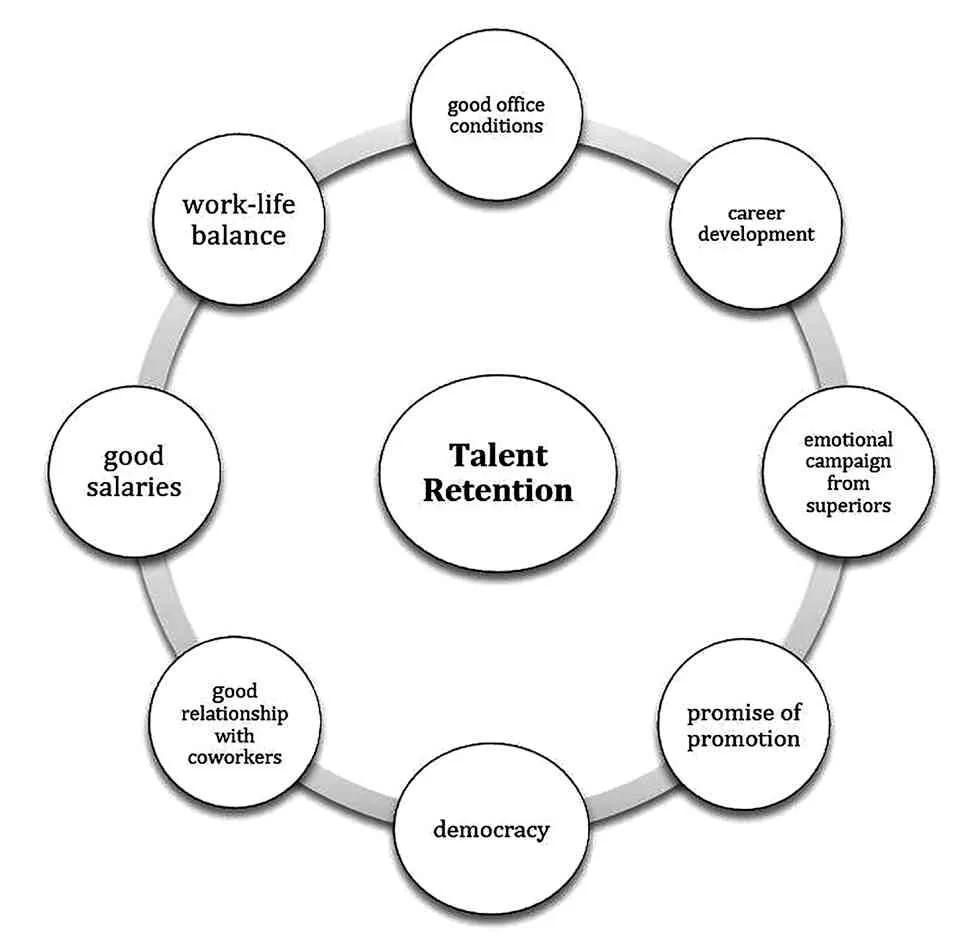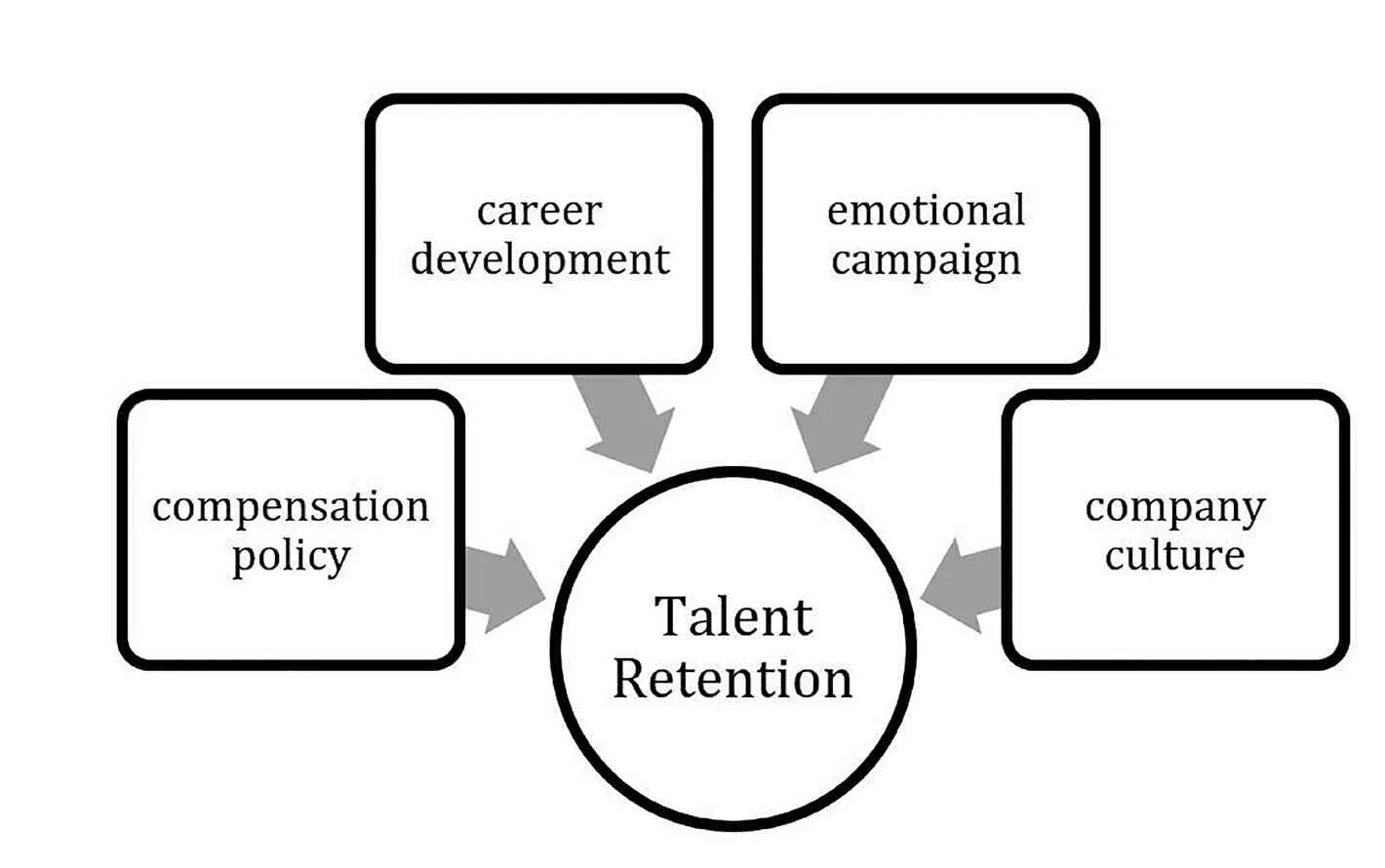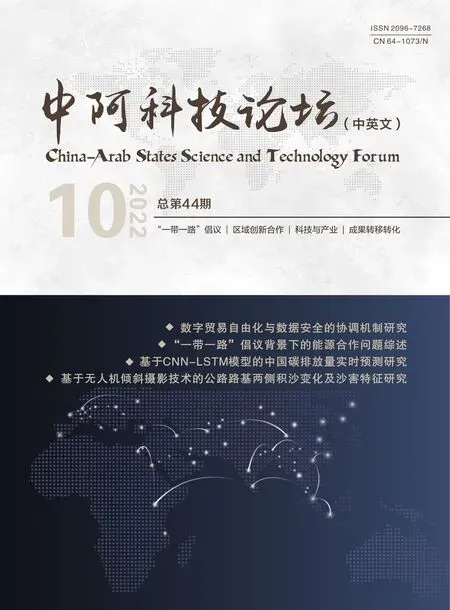Study on the Effective Strategies of Talent Retention in Luxury Hotels of Ningxia
Guo Fanying
(Ningxia Polytechnic,Yinchuan 750001)
Abstract: The hotel industry in Ningxia has been booming in recent years,with the expansion of hotels scale,and the number of luxury hotels is increasing day by day.However,the turnover rate in the hotel industry has always been the highest among all industries,based on which talents retaining has become an important issue.The purpose of this project is to explore the effective strategies of talent retention in luxury hotels in Ningxia,China,to this end,qualitative method will be employed for researching.In the experiment,20 employees of two luxury hotels in Yinchuan,Ningxia are selected as interviewees,and the thematic analysis will be used to analyze the data.Through experimental data analysis and comparison with the conceptual framework,four key aspects of retaining talents are summarized,which are compensation policy,career development,emotional campaign,and company culture.
Key Words:Human resource strategies;Talent retention;Hospitality industry;Luxury hotel
1 Introduction
As a significant fulcrum of the "Silk Road Economic Belt",Ningxia’s hotel industry has ushered in rapid growth in recent years,with Sheraton Hotel and Marriott Hotel opened in Ningxia in 2019[1]and 2020[2]respectively and a new luxury hotel named Desert Star Hotel in Zhongwei of Ningxia awarded the 15th China Hotel Starlight Awards in 2020[3].Additionally,hotel industry is service-oriented and labor-intensive,and therefore requires a large workforce to ensure smooth operation[4].
However,the staff turnover rate in hotels averages around 30%,which is higher than any other service industries,and the high turnover rate has persisted in recent years,sometimes even reaches 50% in a few hotels[5].2022 Asian Business News Data showed that the number of hotel employees continue to decline from 2014 to 2018,which was in part due to the COVID-19[6].According to 2022 Resignation and Salary Adjustment Research Report,the turnover rate of the hotel and tourism industry was 24.7% in 2021,ranking first among all industries[7].
High turnover exerts a negative impact on staff morale and production efficiency[8].This is because in the highly competitive hotel industry,low turnover rates and effective staff management can be helpful in maintaining a high level of service and staying competitive.Hence,it is obvious that talent retention is the key issue in hotel sector.
In recent years,there have been a plethora of papers studying high turnover rate.However,only a few papers have examined the issue of employee retention in terms of the current development status for luxury hotels in Ningxia.
Therefore,this research paper aims to investigate the practical strategies for talents retention in luxury hotels of Ningxia,China.To address this research purpose,the conceptual framework of talent retention strategies will be analyzed through literature review,and then,the effective strategies for employee retention in luxury hotels of Ningxia will be summarized according to the field interview and comparison with the conceptual framework.
2 Conceptual framework for strategies of talent retention
Balakrishnan and Vijayalakshmi (2014) concluded some effective strategies for talent retention,which are suitable for various sectors,including better compensation packages,excellent working conditions,appreciation and motivation,good relationship with colleagues,room for promotion and improvements,better training or working experience and maintaining a work-life balance[9].These are general strategies that apply to most sectors.For hotel industry,specific strategies for talent retention should be concluded from various perspectives.
Firstly,in China,where about 7 million domestic migrant workers were employed in the hospitality industry in 2004,hotels are highly dependent on domestic migrant workers[10].These migrants expect to find a job that they are capable of doing with low educational level,low language abilities and low professional experience,such as entry-level jobs like cleaners and security guards.
Migrant workers attach more importance to wages[11],and for motivating these workers,an approach of giving better pay can do the trick[10].Additionally,they are separated from their family to earn a living,and therefore usually feel lonely and depressed.Hence,on the one hand,managerial support and good collegial relationship exert a positive effect on employees’ commitment and loyalty[11].For example,the lack of warmth of families can be compensated by the cares from peers,which means providing more emotional support and thus releasing the job tensions of migrant workers[10].
Secondly,local employees seems to have higher goals for their career advancement,and democracy,career development and opportunities for promotion are their primary concerns.In order to retain employees,they should be provided with more freedom and opportunities to participate in decision-making process in the workplace[12].Similarly,Yeung (2006) interviewed the manager of Portman Ritz-Carlton,DeCocinis,who stated that companies and employees should work together to solve issues,and discuss what actions can and are being taken,and most importantly,enterprises should maintain a high level of trust with employees,in which case they will be more willing to stay[13].Moreover,Riley (1990) argues that the truly effective strategy is the promise of promotion,while the core element of retention strategies is the managers’ perception of staffs’ personal merit[14].These methods can give employees with higher goals a sense of self-satisfaction.
Thirdly,some researchers have also explored strategies from the perspective of different positions and genders.In terms of different job positions,employee at the managerial level will stay in the organization if they can integrate into the organizational culture and achieve high job satisfaction,and for employees at the operational level,a good working environment,excellent working conditions,good benefits and salary,fair leadership and a good management team are essential for them to stay in the organization[15].
For different genders,a study has shown that work-life conflict and fewer promotional opportunities are key reasons why female employees want to leave their current organizations,whereas lack of job clarity is a more important reason for male when they want to leave[16].
In summary,effective strategies for retaining talented employees for hotel industry can be summarized based on the above discussion,and are clearly presented in table I as follows.
3 Research Method &Data Description
3.1 Research design
Semi-structured personal interviews will be used to collect data about employees’ attitudes and opinions.In the interviews,basic information about the interviewees will be collected,including gender,age,educational level,working hours and job positions,and then,each individual will be asked two open questions,which are listed below:
How do you define 'talent' from your own experiences and judgments?

Table I.The conceptual framework of talent retention strategies
Assuming that you are a talented employee,what can companies do to retain you?
During the interview,respondents were free to express their feelings and opinions,and if some respondents have difficulty in answering the second question,interviewer would raise some key points that summarized in the literature to guide them deliver a relatively complete answer.
3.2 Sample Selection and Data Collection
The researcher selected two luxury hotels with facilities and services comparable to five-star hotels,Company A,a longestablished international hotel,and Company B,a local luxury hotel.In terms of sample selection,interviews were conducted on ten employees from each of the two hotels,and the length of interview is controlled to 5 to 10 minutes each.The basic profiles of the 20 interviewees are presented in table II below.
3.3 Data Analysis
After completing data collection through in-depth interviews,the data was transcribed into written form.In this qualitative research,thematic analysis will be used to examine the themes within data,a method that focuses on organizing and describing the data set.
Thematic analysis identifies implicit and explicit views by collecting each phrase or word in the interview[17].Therefore,in the following,the interviews data will be summarized to principal points firstly,and then details of that point will be examined through thematic analysis to restore a new set of frameworks of talent retention after a comparison with the theoretical framework.
3.4 Research Ethics
Written consent has been given by the companies to undertake this research,and the authenticity of the data will be guaranteed.In addition,the names of the interviewees and hotels will not appear within this research paper,meaning that the study is anonymous and the entire scripts of interview and recordingswill not be accessible.

Table II.Basic Information of 20 Interviewees
4 Interview Findings
Based on the interview data,the strategy of talent retention can be grouped into 4 overarching themes with 7 sub-themes,as shown in table IV below.Each theme will be analyzed respectively,and then compared with the previous point of theoretical framework that mentioned in the section of literature review,some unavailable points will be discussed as well.

Table III.Overarching themes and sub-themes of the strategies of talent retention
4.1 Compensation policy
4.1.1 Good salaries
The first sub-theme is gross salary,which involves wage rate per hour,piece wage,bonus,subsidy,welfare,and overtime pay.This seems to be a primary and essential demand of each employee working in a company.During the interview,this point was raised first and foremost by the majority of participants.Some interviewers claimed that: "well,of course,we work for the money,for more money" (interviewee 1 of company B);"I wish I can enjoy a fair pay policy,and that the company can pay more attention to equity" (interviewee 9 of company A);interviewee 8 of company B,a chef,stated: "actually,I’ve wanted to quit for a long time[interviewer: can you tell me why,and what can the company do to make you stay?]A pay rise of course,if the other company can pay me more,I would leave".From these answers,the importance of compensation policy can be seen.
4.1.2 Material rewards
There is a slight difference between salary and material rewards.The latter is a main approach to motivate talented employees and to mobilize their enthusiasm.Interviewee 3 of company A thought: "I wish company can organize some outdoor activities like hiking,camping,and party,which can relax us and strengthen team spirit".The other respondent also stated that "Our staff meals are satisfactory,but I think they should be better so that we can enjoy a delicious meal while working hard" (interviewee 7 of company A).According to these responses,material reward does not seem to be a primary factor like salary,yet it is indispensable for most employees.Therefore,it seems to be a catalyst,and meanwhile,it lets employees know that they are being paid attention to by the company thus keeping them enthusiastic and optimistic about the company and their current jobs.
4.2 Career development
4.2.1 Provide platform and channel of career development
Nearly half of the respondents give credit to the importance of this point and explained in detail to interviewer from their perspective.For instance,a sales account manager of company A (interviewee 8) elaborated that: "I think it’s highly important for companies to provide us with as many channels as possible for career advancement,such as training and learning,by which means we can improve ourselves".The other respondent also claimed that: "I wish I can realize my career prospects through working for this company,and it would be perfect if the company can offer an advisor to me for planning and guiding my work,and give us more opportunities for training and learning." (interviewee 3 of company A).In conclusion,it seems that most employees attached great importance to various opportunities of training and learning to help them achieve their career prospects.
4.2.2 Promise of promotion
Based on the interview data,this sub-theme can be further divided into two categories,which are explicit and implicit respectively.With respect to explicit meaning,most participants firstly answered the second question: "Promotion means a raise in salary!" This implies that some employees would equate promotion to salary raise,and they may value salary raise more than promotion.Regarding implicit meaning,some participants provided a detailed explanation.Interviewee 6 of company A expounded: "I want to be promoted,but I want my supervisor and company to tap and explore my potentials,so that I can realize my own value,because I think higher job level means greater responsibility".From this point,it can be seen that some employees regard promotion as the realization of self-value instead of just a salary raise,and these staffs are more concerned about their career prospects and self-worth.This point was mainly emphasized by employees with higher educational level and work in managerial level.For those people,the best way to retain them is the promise of career development rather than an excellent compensation policy.Companies should recognize the difference in employees and establish targeted compensation policy.
4.3 Emotional campaign
Based on the literature review,this part involves two main sections,which are support and understanding of supervisor as well as the healthy relations between colleagues.However,it was found from interviews that the second point was not mentioned whereas the first point was mentioned by some older respondents.Therefore,the first point will be discussed in dedail as follows .
4.3.1 Understanding and support of supervisor
Interviewee 5 of company B,a security supervisor of 45 years old,answered the first question: "well,for people,I think besides material things,the spiritual things are also important,such as understanding,support and appreciation,so that we can work happily".It seems that understanding and support are spiritual incentives and also serve as the recognition of the efforts employees put in.It can motivate and encourage employees.Elder employees seems to focus more on spiritual requirements instead of material demands.Therefore,it appears that this sub-theme is significant for specific type of employees.
4.4 Company culture
4.4.1 Excellent operation model and management system
A brilliant operation and management system can attract and retain talents,while a good corporate culture and philosophy is a key reason of talents working in here.In company B,interviewee 6 claimed that: "I wish our hotel can constantly perfect the operation system,and let more people know about our hotel,and company should provide an environment of benign competition".In company A,most participants stated that: "I think our company has an excellent and mature.management model,and I think it is good".Based on data,interviewees prefer to stay in a company with a strategic operation and management system as they prefer to work in a company with a bright prospect.
4.4.2 Consistent between company culture and employees’philosophy
Some interviewees who work in managerial level picked up it based on data results.Interviewee 8 of company A,a sales account manager,said: "I think if companies want to retain talents,the key point is consensus [interviewer: do you mean that corporate culture and employees’ philosophy should be consistent?]yes! Of course!"The other interviewee,a concierge supervisor in company B explained: "I think hotel industry should center on the service and customers instead of the competition within internal leadership,and if a company failed to do that,I will leave".It seems fair to conclude that employees,especially in managerial level,would cite this point as a key reason for staying or leaving.
5 Discussion
Based on the evaluation of interview results,some key points are concluded and will be discussed in the following.
Firstly,in terms of the interview findings,it can be found that different strategies can be derived for different types of employees.
On the one hand,for different education level,employees with low education level seems to be mainly concerned with an excellent compensation policy whereas employees with high education level pay more attention to their career development.
On the other hand,for different job levels,employees at managerial level regard a good corporate culture and philosophy as the most important reason for staying in their current company,while elder employees may value the emotional campaign more.
Secondly,the concerns of employees in different types of companies are also varied.For example,company A is a longestablished international hotel with a relatively mature operation and management model,so that employees they recruit mainly focus on career development and company culture.On the contrary,company B is a newly-established local luxury hotel,which lacks experience and mature management system,hence,most of its employees pay more attention to a good compensation policy and emotional campaign.
To sum up,the strategy of talent retention of Ningxia can be summarized into four categories,namely,compensation policy,career development,emotional campaign,and company culture.Which are presented in the table below:
Comparing with conceptual framework that was presented in literature review,there are several points that were not mentioned by any interviewees,such as work-life balance,office condition,democracy,and a good relationship with colleagues.
In terms of work-life balance and office condition,interviewees didn’t consider either of these to be important to them,one respondent commented: "[interviewer asked: 'how about work-life balance? or office condition?']we have a very standard working schedule and we don’t need to work overtime,so I don’t have to deal with work-life conflicts".In addition,most participants did not explain the reasons why office condition is not important.In my opinion,it might be because most hotel employees have flexible workplaces,which means that where they work is where the customers stay.

Table IV.The new framework of talent retention strategies
The aspect of democracy was not mentioned by the interviewees despite the interviewer’s guidance,and it seems that hotels and employees have not realized the significance of democracy.This might due do the fact that hotel industry is service-centered rather than intelligence-intensive.In other sectors like financial business,democracy is relatively more important because it’s critical for copanies to draw on the wisdom of the masses to make an informed decision.
Concerning good relations with colleagues,some interviewees explained that: "I think fulfilling our own duties is of key importance,and having a smooth cooperation with colleagues is enough".It can be seen that good personal relationship is not the key factor for employees to decide whether to resign or not,and employees value good relations with customers more than colleagues.
In essence,based on discussion above,for luxury hotels in Ningxia,they should select different retention strategies according to different hotel operation system and types of employees,such as offering a good salary for employees with low level of education,provide more training opportunities for employees with high level of education,offer promises of promotion for employees working in managerial level and provide more emotional campaign for the elder employees.
6 Conclusion
In conclusion,this project was devoted to exploring effective strategies to retain talents in Ningxia luxury hotels through indepth interview and thematic analysis,so as to assist hotels in initiating some suitable strategies to retain employees and make their businesses prosper.
Based on research result,four main effective strategies of talent retention were summarized,namely,a good compensation policy,provision of career development,emotional campaign from supervisors,and an excellent company culture and philosophy.In addition,these four strategies seem to be applicable to various industries,and in terms of hotel industry in Ningxia,these should be prioritized as hotels seek effective strategies for talents retention.
However,there are some research limitations in this project.Firstly,both hotels interviewed are located in Yinchuan of Ningxia,and the sample size is small and may not be representative.Secondly,this study was conducted without adequate consideration of the impact of COVID-19.If Covid-19 persists,hotel operation and management mode may be adjusted accordingly,and staffs’opinions and perception of working in hotels may change.
Therefore,in future studies,it seems appropriate for researchers to conduct field surveys with more respondents in different cities and to fully consider the social development status of Ningxia,particularly for hotel development trends under the long-term impact of Covid-19 and even in the post-pandemic era.

